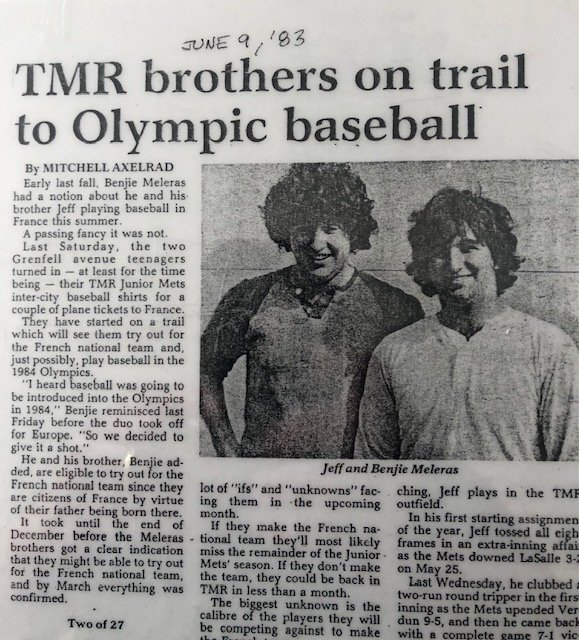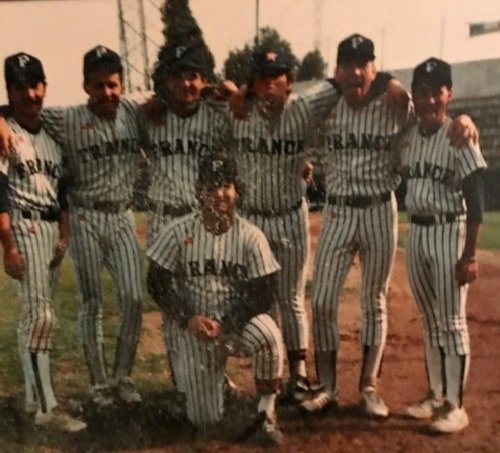⚾0️⃣4️⃣5️⃣ Benjie Meleras
Meet Benjie Meleras, a French-American helping to elevate baseball on both sides of the Atlantic Ocean.
Born in Brooklyn, NY in 1964 to an American mother and French father (who were married in Paris), Meleras grew up in Montreal. That’s where he developed his passion for baseball. “I always liked the team spirit and, as a bonus, I was a good little player with a good arm,” he told French baseball chronicler Gaetan Alibert. At age 16, Meleras began his university career at Hobart College in Geneva, NY, where he was a varsity NCAA Division Three baseball player. He graduated in 1984, believed to be the youngest Hobart alumni at age 19, then crafted a career in the game in France as well as with Major League Baseball’s Canadian and U.S. teams.
Benjie’s Story
Local article featuring the Meleras brothers just before they headed to Paris. Scan: Benjie Meleras.
France always felt like a home to Meleras, thanks to regular visits to his father’s family throughout his childhood and teenage years. But baseball wasn’t something he encountered during those trips. “It was like a dream, it didn't really exist [in France] in the 1970s,” he recalled of the era. When he did discover baseball’s existence in the hexagone, he was filled with questions, such as how did it survive, what was the caliber like, and would he–and his younger brother–fit in playing there?
During and after college, Meleras and his younger brother Jeff opted to play baseball in their father’s homeland for Paris Université Club. The legendary multi-sports club was more well-known for its men’s and women’s basketball prowess, but the baseball team was also nationally recognized and dominated the French championship from 1965 through the early 1980s. At the time, PUC played their home games and hosted International tournaments at La Cipale, the historic Velodrome that served as the finish for many Tour De France and hosted events during the 1900 and 1924 Olympics.
When their cousin picked them up at the airport and drove to what passed as a baseball diamond in the Parisian suburbs, it was a wake-up call. “Let’s call it a patch of grass,” Meleras recalled decades later of that introductory field. “There was a telephone wire running across the field and the pitcher’s mound was set up a little closer to home plate than it should be.”
“Our teammates made us feel right at home, like part of the family. That’s important in all sports, especially for newcomers to a team”
It was a baptism into baseball in France, and the lack of baseball infrastructure was a surprise. But one thing was not: the people.
Benjie Meleras and David Meurant European A Cup Paris 1987. Photo: Benjie Meleras.
Knowing the language, culture, and the country thanks to his family ties was helpful in the initial transatlantic transition. The Meleras brothers rapidly became part of the team. “We were just happy to be there,” he recalled of how they lived a very unique, special baseball chapter.
He noted how his teammates were passionate about baseball, something that further helped to easily cement bonds. “They played for the love of the game, it was a devotion,” he said, for there was no money to be had playing baseball in France at the time. Many teams, PUC included, struggled from year to year to survive.
From 1983 until 1987, Meleras communicated, represented, and negotiated his French teammates’ understandings and opinions about the United States, often translating what his U.S. university or baseball experiences were like. He also enjoyed being around some of the former MLB players who played in European leagues, he recalled, a grace note to the overseas adventure of baseball (n.b. Lenny Randle and Win Remmerswaal were ex Major Leaguers playing in Italy in 1983, Bob Pate in 1984- and 1985). Meleras pitched against former Major Leaguer Randy Hunt at the European A Cup in Paris.
April 1993 Dunedin, Florida receiving World Series ring from Paul Beeston President and CEO of Toronto Blue Jays. Photo: Benjie Meleras.
The Sports Diplomacy Connection
Meleras engaged in informal, or unofficial, sports diplomacy as a private citizen playing with PUC, but also once he returned to North America and began a career with Major League Baseball. Through his work with the Toronto Blue Jays (with who he won two World Series rings), Montreal Expos, and the Saint Louis Cardinals’ farm team, Meleras represented, communicated, and negotiated North American perceptions about France and its baseball. He relayed the game’s history in the hexagone, stories surrounding its national team, and engagement with French baseball fans. When he joked with Toronto Blue Jays officials that their scouts should include France on their itineraries, he also informed them how there was indeed baseball in France, raising such awareness.
But Meleras, who holds dual citizenship, also served as a formal sports diplomat in playing for the French national baseball team. In fact, one of his most cherished sporting moments came when he was the starting pitcher for Les Bleus against hosts of the 1983 European Baseball Championships, Italy, which also served as the Olympic Qualifying Tournament for the 1984 Los Angeles Games.
Eighteen-year-old Meleras was thrilled to feature in front of some 10,000 fans, fêted by fireworks. Although by the game’s end his arm hurt and the team lost by 30 runs, the match stands out years later as one of his prized memories.
“It’s not about the success on the field for me,” he said.
According to Meleras:
I was there to enjoy it, to absorb it. To me, that is what international sports and friendships are about. Those are the memories. There was an abundance of fans that came to the games, it made it feel like it was an important event, which it was: it was the Olympic Qualifying Tournament.
Members of the French National Team 1987 European Championships/Olympic Qualifying Barcelona. Photo: Benjie Meleras.
In the years since, Les Bleus players increasingly traverse the Atlantic Ocean in the other direction, from France to the United States, such as Mathias LaCombe (drafted by the Chicago White Sox in 2023). And Meleras is there, cheering them on.
He’s proud of how he represented France on the international stage. “It’s a big deal that you play for the national team. Even as they are [today] doing better, you know that you were a small piece of that larger story.”
And he’s incredulous for how his ability to serve as a type of baseball sporting diplomat enriched his life.
“It was such an experience, to be able to play against other countries. Whether it was the club team or on the national team level, it was incredible to experience things that I would never have done on the baseball field in the Americas.”
Watch Meleras pitch for Les Bleus at 13:00-15:00
Mapping the Connection
From Montreal, Canada and Geneva, New York to Paris, France
Further Reading/Resources
[E] Benjie Meleras, interview with the author, March 2024.
[F] Gaetan Alibert, “Interview PUC 100ans – Benjie Meleras ‘je fus surpris par l’état d'esprit en France,’” TheStrikeOutFrance.com August 19, 2023.
[E] Benjie Meleras, The Golden Moment: A novel about baseball, a novel about life, a novel about dreams (Trafford, 2019) and Sandborne’s Boys (2019).
How to Cite This Entry
Krasnoff, Lindsay Sarah. “Voices: Benjie Meleras,” FranceAndUS, https://www.franceussports.com/voices/045-benjie-meleras. (date of consultation).






